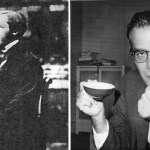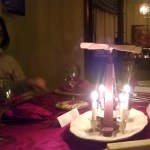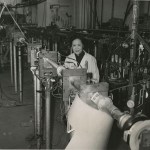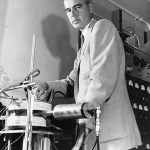
Dr. Tyson:
(I find the faux-familiar thing people do with "open letters" really grating, so I'm not going to presume to call you "Neil" through the following...)
First of all, I should probably say "Thanks," because I'm using some of your material in my class this term-- I had them read Stick in the Mud Astronomy, and contrast it with wacky Ancient Alien stuff, and gave them a second assignment based on Manhattanhenge, so that stuff's great. And I'm psyched to hear you've gotten your own talk show. So, you know, that stuff's awesome. Thanks.
And I should also note that while I haven't always…
I've decided to do a new round of profiles in the Project for Non-Academic Science (acronym deliberately chosen to coincide with a journal), as a way of getting a little more information out there to students studying in STEM fields who will likely end up with jobs off the "standard" academic science track.
The fourteenth profile of this round (after a short hiatus for relentless book promotion) features the founder of a new crowd-funding platform for physics.
1) What is your non-academic job? I am the Founder and President of Fiat Physica, the world’s premiere physics fundraising platform.…
Two new items about Eureka: Discovering Your Inner Scientist:
1) WAMC has now posted the interview I did with Joe Donahue on The Roundtable. This was a fun interview, and covers a number of examples from the book, so I think gives you a really nice sense of what it's all about.
2) There's a review of Eureka in New Scientist, along with two other books. It's fun to see all these different publications do reviews, because every reviewer latches onto a different example to feature. You can almost deduce the entire contents of the book if you read all of the different reviews...
The New Scientist…
I exchanged a bunch of emails a week or two ago with a journalist who was working on a story involving the possibility of faster-than-light travel. He wanted me to check some statements about the relationship between FTL and causality. FTL creates problems for causality, because if you have an object moving faster than light, there will be pairs of observers who see events involving the FTL object happening in different orders, which means somebody will see an effect happen before its cause.
I talk about this is How to Teach Relativity to Your Dog using the example of a stationary dog, a…
I've been intermittently profiling people with STEM degrees and non-academic jobs since 2009, as it turns out. One of the questions in the profile asks "What’s the most important thing you learned from science?" These have been some of the most interesting responses, so I thought it might be interesting, while I sit here and wait out a two-hour delay in the opening of the kids' schools, to compile those answers through the years.
These are in roughly chronological order, and I've left the names off because... Well, mostly because I'm being lazy, but I can invent a principled reason about how…
I've decided to do a new round of profiles in the Project for Non-Academic Science (acronym deliberately chosen to coincide with a journal), as a way of getting a little more information out there to students studying in STEM fields who will likely end up with jobs off the "standard" academic science track.
The thirteenth profile of this round (after a short hiatus for relentless book promotion) features Twitter's own Dr. Mathochist, a mathematician turned software engineer.
1) What is your non-academic job? I'm a software architect at a small company working on a mixture of contracted and…
Back in December, The Parable of the Polygons took social media by storm. It's a simple little demonstration of how relatively small biases can lead to dramatic segregation effects, using cute cartoon polygons. You should go read it, if you haven't already. I'll wait.
This post isn't really about that. I mean, it is, but it's using it for something dramatically different than the intended purpose of the post. You see, I am such a gigantic dork that when I looked at their toy model, the first thing that came to mind was physics.
(And, in fact, I sat on this post topic for the better part of a…
(When I launched the Advent Calendar of Science Stories series back in December, I had a few things in mind, but wasn't sure I'd get through 24 days. In the end, I had more than enough material, and in fact didn't end up using a few of my original ideas. So I'll do a few additional posts, on an occasional basis, to use up a bit more of the leftover bits from Eureka: Discovering Your Inner Scientist...)
One of my very favorite stories about a famous physicist concerns a young man of about 19, arriving at Cambridge from the University of Edinburgh. While being introduced around the college, it…
I've decided to do a new round of profiles in the Project for Non-Academic Science (acronym deliberately chosen to coincide with a journal), as a way of getting a little more information out there to students studying in STEM fields who will likely end up with jobs off the "standard" academic science track.
The twelfth profile of this round (after a short hiatus for relentless book promotion) features a distinguished Union Physics alumnus, now a business analyst in New Jersey.
1) What is your non-academic job? I work at the Princeton, NJ office of ZS Associates, a company that describes…
Over on Facebook, my colleague Chris Chabris was talking up a smartphone game from a company he's associated with. Which of course got me thinking "Wait, why don't I have a smartphone game company?" (The Renaissance Weekend is also partly to blame, as I was one of about six people there who didn't have a start-up company of some sort...) Which, in turn, led to the realization that there really ought to be a quantum optics video game. Or maybe a series of games, because you could construct a whole bunch of puzzlers around quantum phenomena:
-- The most basic would be to do something like the…
"Hey," you say, "It's been, like, a week and a half since you did a post flogging Eureka: Discovering Your Inner Scientist. What gives?" Well, I've been kind of busy, and also the media world sort of goes into suspended animation over the stretch between Christmas and New Year's.
However, there's publicity stuff in the works. Specifically, the interview I recorded with Joe Donahue for The Roundtable on WAMC will probably air today. I'm not sure exactly when-- the show runs from 9am to noon, but I would bet on some time between 10:20 and 11:45, because I'm teaching a class then.
Anyway, it's…
As mentioned briefly here and on Twitter, I spent the past week at the Renaissance Weekend in Charleston, SC. This is a biggish smart-people festival, running for 30-odd years now, bringing together a wide array of people from politics, finance, science, and the arts. Bill Phillips has been going to it for years (though he wasn't there this year), so when I got the invitation, I jumped at it.
Unfortunately for blog purposes, they have a strict policy about everything said there being off the record, so I can't post really detailed stories about anything, but it was a very cool experience. And…
So, it's January 1, which means a ton of social-media traffic commenting on the year just concluded, most of it very negative-- "Good riddance, 2014, don't let the door hit you on the way out, etc." I'm a little more ambivalent about the whole 2014 thing, and of course, being a good squishy liberal, I feel guilty about that.
Because, of course, in a lot of ways, 2014 was very good for me, personally. This is probably exemplified by my current circumstances-- I'm typing this from the tail end of the Renaissance Weekend (actually, from a Starbucks across the street, because I thought that…
A little while back, somebody on the Hold Steady fan message board put out a request for people's all-time Top Ten songs. This is a really hard question, but a fun one, so of course I couldn't resist. And since the overlap between there and here is pretty minimal, I'll recycle the message I sent for a quick and easy pop-culture blog post to ring out 2014 (links are to YouTube videos).
------------
Hard to rank-order these, because it's mostly a list of songs that have been personally significant to me at some point, so this is basically reverse-chronological autobiographical order. Which is…
One of my Christmas gifts this year was a Seek Thermal camera, so I can continue my transformation into Rhett Allain. What's this for? Why, physics, of course. Such as this video of the operation of the Christmas pyramid my parents picked up in Germany, and had set up at the start of Christmas dinner:
Sadly, the Seek Thermal app doesn't seem to record audio with the video, so you miss out on SteelyKid's running commentary about the whole thing... But you can fairly clearly see the plumes of hot air rising up from the candle to push the vanes of the fan. There's probably a way to estimate the…
Ernest, the purple aardvark
Had a long and hairy nose
And if you ever saw it,
You would really say "Boy I bet you could eat some ants with that thing..."
All of the ants in Tasmania
Use to run away when they saw him
Because if they ran to slowly,
[Loud slurping noise] Ernest ate them up.
Then one foggy Christmas Eve,
Santa came to say,
"Ernest, we have a terrible infestation of termites at the North Pole,
Can you come eat them up while I deliver toys to good boys and girls?"
Then how the elves they loved him,
And they knitted him warm nose cozies
Because aardvarks normally live in tropical…
Once again, it's Christmas for those who celebrate it, and a really boring Thursday on the Internet for those who don't. In keeping with tradition, we've taken the kids to Grandma and Grandpa's house in Scenic Whitney Point, NY for a few days.
This will coincide with a big drop-off in social media use on my part, for a number of reasons; I've got one more post scheduled for the day after tomorrow, and that's probably it for 2014 blogging. I'll be ringing in the New Year in Charleston, SC at the Renaissance Weekend event there, and while that promises to be a good deal of fun, they've got very…
When I launched this back at the start of December, I honestly wasn't sure I would have enough good stories to make it through. I suspected I might end up going a week or two, then quietly letting the whole thing drop. As we come to the end, though, I've run out of days well before running out of stories. There's this one slot left, and a huge number of great stories I could relate-- Pauli proposing the neutrino as an act of desperation, or Cowan and Reines detecting it. The race to split the atom in the 1930's, won by Rutherford's Cavendish Lab. Julian Schwinger's odd work schedule. John…
For the penultimate advent calendar of science stories post, we'll turn to a great experimentalist with a great biography. This story also appears in Eureka: Discovering your Inner Scientist, but it's too good not to re-use.
Chien-Shiung Wu was born in china in 1912, at right around the time education of women was first legalized. Her father founded a school for girls so he could teach her, then at around the age of 10 she went off to a boarding school, and then the best universities in the country, where she distinguished herself as one of the finest math and physics students in China. At…
One of the very best books I ran across in the process of doing research for Eureka is The Second Creation: Makers of the Revolution in Twentieth-Century Physics by Robert P. Crease and Charles C. Mann. It's an extremely detailed treatment of the development of quantum theory, and includes anecdotes that I haven't seen elsewhere. It also does a fantastic job of showing the essential interplay of experiment and theory through the difficult process of developing quantum field theory, which is often underplayed in popular treatments (which tend to be written by theorists, and often treat…








